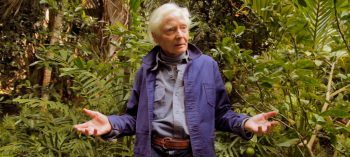John Freeman at Literary Hub:

This inward movement of Merwin’s poetry happened simultaneously with a radical stylistic shift. In the introduction to The Second Four Books of Poems, Merwin describes how, beginning in the early 1960s, he began to shed punctuation, until he had given up on it entirely. “I had come to feel that it stapled the poems to the page,” he wrote. “Whereas I wanted the poems to evoke the spoken language, and wanted the hearing of them to be essential to taking them in.” In The Moving Target, the first of these four books, one feels the heat and pressure of this change keenly. “To My Brother Hanson,” addressed to a sibling who died in childbirth, Merwin’s lines hint at the scale of his project to come. “Yes, now the roads themselves are shattered / As though they had fallen from a height, and the sky / It is cracked like varnish.” In this period, Merwin began living part of each year in a rundown farmhouse in south- west France that he bought on the cheap with a small inheritance. It was part of a very old world, whose history and animal life humbled him while it also provided a doorway to a new kind of writing. The Vietnam War was raging, and although few poems in The Lice address it directly, the grim vision they evince of life’s evanescence, its violence, even, have the barbed edge of anger. At times it reads as if the poet is trading his citizenship for a larger tribal sense of belonging. “If there is a place where this is the language,” he writes in “The Cold Before the Moonrise,” a poem about the turning of the night, “may / It be my country.”
more here.
